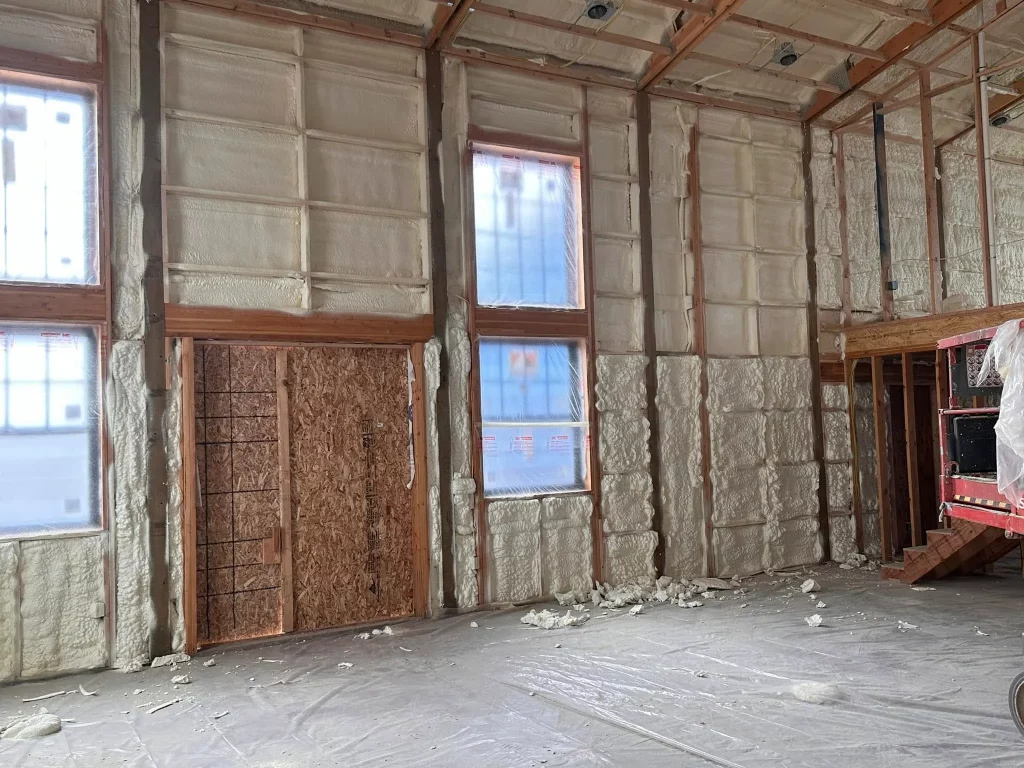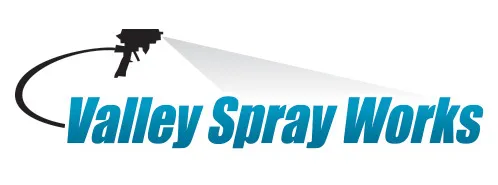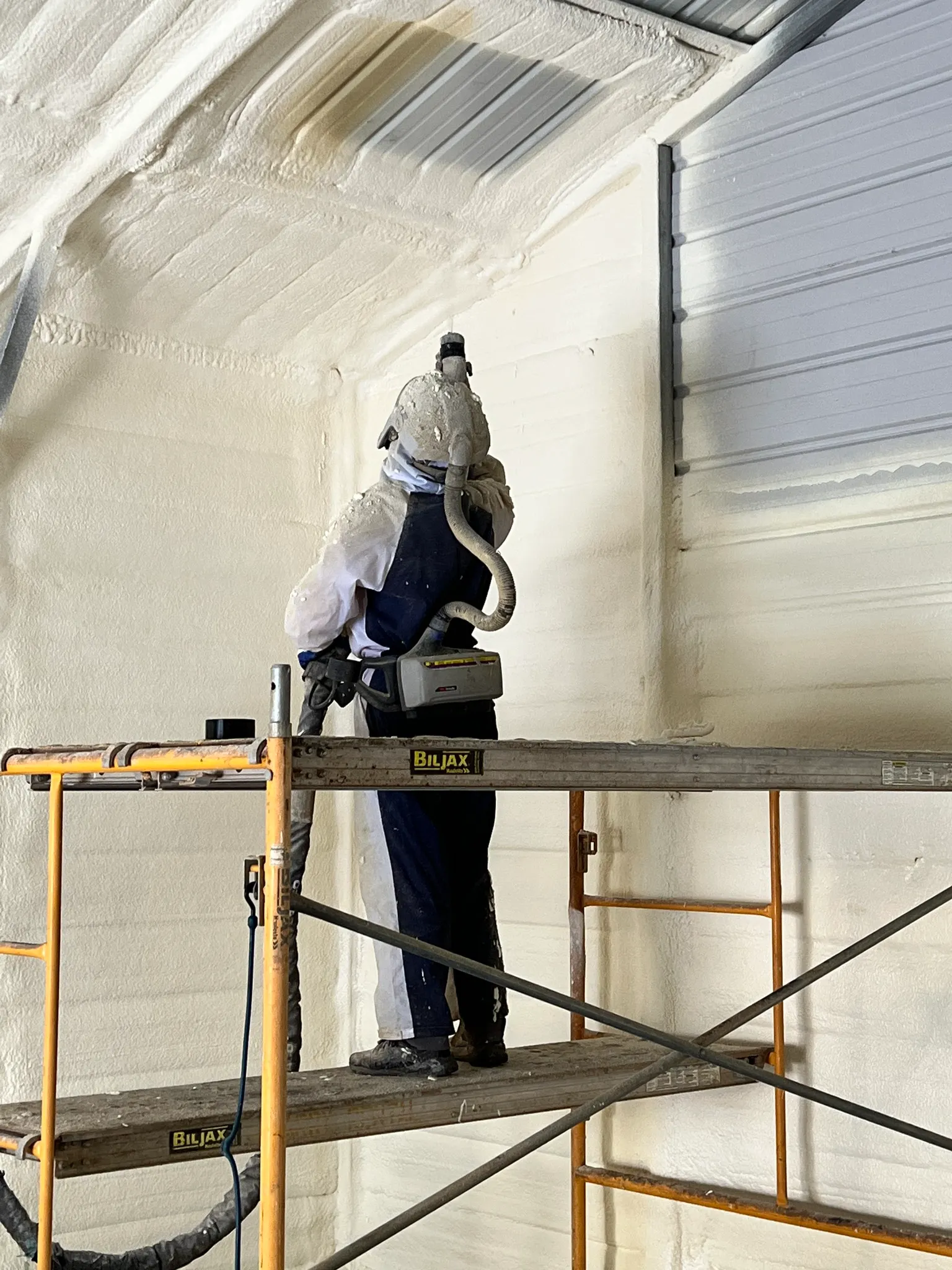Professional insulation contractors bring specialized equipment, technical expertise, and safety protocols that deliver superior results compared to DIY attempts. These experienced professionals understand building codes, material properties, and installation techniques that maximize energy efficiency while preventing costly mistakes. Property owners who invest in professional installation typically achieve 25-40% better thermal performance and avoid common issues like air leaks, moisture problems, and uneven coverage.
1. Technical Expertise and Material Knowledge
Professional insulation contractors possess comprehensive understanding of thermal dynamics, vapor barriers, and material compatibility. This expertise prevents costly errors that can compromise building performance and create long-term problems. Contractors evaluate factors like R-value requirements, moisture management, and air sealing strategies based on specific building characteristics and climate conditions.
Bonus Tip: Experienced contractors can identify thermal bridging issues during installation that untrained installers often miss, potentially saving thousands in future energy costs.
| Insulation Type | Professional Installation Requirements | DIY Risk Factors |
|---|---|---|
| Spray Foam | Temperature-controlled equipment, proper PPE, chemical mixing | Chemical exposure, uneven application, equipment malfunction |
| Blown-In Cellulose | Calibrated blowing equipment, density calculations | Poor coverage, settling issues, moisture problems |
| Batt Installation | Proper cutting, air sealing, vapor barrier placement | Gaps, compression, thermal bridging |
| Rigid Board | Precise cutting, adhesive application, joint sealing | Poor fit, air leaks, structural issues |
2. Advanced Equipment and Application Methods
Professional contractors utilize commercial-grade equipment that delivers consistent, high-quality results impossible to achieve with consumer tools. Spray foam systems require specialized proportioning equipment that maintains exact chemical ratios while adjusting for temperature and humidity variations. Blown-in insulation machines provide precise density control that ensures proper coverage without settling or void formation.
The equipment investment for professional-grade insulation installation often exceeds $50,000, making it economically unfeasible for individual property owners. This equipment undergoes regular calibration and maintenance to ensure optimal performance throughout each project.
3. Safety Protocols and Health Protection
Insulation installation involves numerous safety hazards, from chemical exposure to respiratory risks and fall protection requirements. Professional contractors implement comprehensive safety programs that protect both workers and building occupants during and after installation. Chemical-based insulation materials require specific ventilation protocols and personal protective equipment that most property owners lack.
Bonus Tip: Professional contractors carry specialized insurance coverage for chemical exposure and property damage that protects property owners from liability during installation.
4. Code Compliance and Permit Navigation
Building codes specify minimum insulation requirements, installation methods, and inspection protocols that vary by jurisdiction and building type. Professional contractors stay current with these evolving standards and handle permit applications, inspections, and compliance documentation. This expertise prevents costly code violations that can delay projects and require expensive remediation.
| Code Requirement Category | Professional Compliance Benefits | DIY Compliance Risks |
|---|---|---|
| Thermal Performance | Proper R-value testing and documentation | Inadequate performance, failed inspections |
| Fire Safety | Correct fire-rated assembly installation | Code violations, insurance issues |
| Vapor Control | Strategic vapor barrier placement | Moisture problems, structural damage |
| Air Sealing | Comprehensive sealing protocols | Energy loss, comfort issues |

5. Long-Term Performance and Warranty Protection
Professional installations include performance warranties that protect property owners from material defects and installation errors. These warranties typically cover 5-20 years depending on material type and application method. Contractors also provide maintenance recommendations and periodic inspections that extend system lifespan.
The International Energy Conservation Code reports that professionally installed insulation systems maintain 95% of their initial R-value after 20 years, compared to 70-80% for DIY installations. This performance difference translates to significant energy savings over the system’s lifetime.
6. Comprehensive Project Management
Professional contractors coordinate all project aspects, from material procurement to waste disposal and site cleanup. This comprehensive approach ensures project completion on schedule while minimizing disruption to building occupants. Contractors also handle specialty requirements like vapor barrier installation, air sealing, and integration with HVAC systems.
Project management includes coordinating with other trades, scheduling inspections, and handling any unexpected conditions that arise during installation. This expertise prevents delays and ensures smooth project completion.
7. Cost-Effectiveness Through Proper Installation
While professional installation requires higher initial investment, proper techniques and materials selection deliver superior long-term value. Professional contractors eliminate waste through accurate material calculations and efficient installation methods. They also prevent costly mistakes that require remediation or system replacement.
Energy modeling studies indicate that professional insulation installation pays for itself through energy savings within 3-7 years, depending on climate conditions and building characteristics. DIY installations often require additional work to achieve similar performance levels, increasing overall project costs.
Valley Spray Works Professional Insulation Services
Valley Spray Works provides comprehensive insulation solutions that meet diverse building requirements and performance objectives.
- Open-Cell and Closed-Cell Spray Foam: Advanced application techniques for superior air sealing and thermal performance in residential and commercial applications
- Blown-In Insulation Systems: Precision installation methods that ensure optimal density and coverage for maximum energy efficiency
- Intumescent Fire Protection Coatings: Specialized fire-rated applications that meet strict safety codes while providing thermal insulation benefits
- Commercial Roof Insulation: Comprehensive roofing insulation systems that reduce energy costs while extending roof membrane lifespan
Common Questions About Professional Insulation Installation
What qualifications should I look for in an insulation contractor?
Verify state licensing, manufacturer certifications, and comprehensive insurance coverage including general liability and workers’ compensation. Experienced contractors should demonstrate knowledge of local building codes and energy efficiency programs.
How do I evaluate insulation contractor proposals?
Compare detailed specifications including material types, R-values, installation methods, and warranty terms. Avoid contractors who provide verbal estimates or fail to specify performance metrics and compliance requirements.
What should I expect during the installation process?
Professional contractors provide project schedules, site preparation requirements, and occupancy recommendations. They should explain safety protocols and coordinate with building occupants to minimize disruption while maintaining safety standards.
Ready to Improve Your Building’s Energy Efficiency
Professional insulation installation represents a significant investment in building performance, comfort, and energy efficiency. Property owners should evaluate their specific requirements, climate conditions, and long-term objectives when selecting insulation solutions and contractors.
Valley Spray Works brings extensive experience in commercial and residential insulation applications throughout the region. Their certified technicians utilize advanced equipment and proven installation methods that deliver superior results and long-term value. For comprehensive insulation solutions that meet your specific needs, contact Valley Spray Works at (208) 539-5281 or reach out via email at [email protected] to discuss your project requirements and schedule a professional assessment.
Essential Information for Property Owners
How long does professional insulation installation typically take?
Installation timeframes vary based on building size, insulation type, and project complexity. Residential projects typically require 1-3 days, while commercial installations may extend over several weeks. Contractors provide detailed schedules that account for weather conditions, material delivery, and coordination with other trades.
What maintenance do professionally installed insulation systems require?
Most professional insulation systems require minimal maintenance when properly installed. Annual visual inspections help identify potential issues like settling, moisture intrusion, or mechanical damage. Spray foam systems typically require no maintenance, while blown-in materials may need periodic evaluation for settling or pest intrusion.
How do I know if my existing insulation needs replacement or upgrading?
Professional energy audits identify insulation deficiencies through thermal imaging and performance testing. Signs that indicate insulation problems include uneven temperatures, high energy bills, ice dam formation, and excessive HVAC runtime. Contractors can assess existing systems and recommend cost-effective improvement strategies.
What environmental factors affect insulation performance and selection?
Climate conditions, humidity levels, and seasonal temperature variations influence insulation material selection and installation methods. Professional contractors evaluate these factors along with building orientation, ventilation systems, and moisture management requirements to optimize system performance.
Can professional insulation installation qualify for energy efficiency incentives?
Many utility companies and government agencies offer rebates and tax credits for energy-efficient insulation upgrades. Professional contractors often assist with documentation and compliance requirements for these programs. Proper installation and material specifications are typically required to qualify for available incentives.



